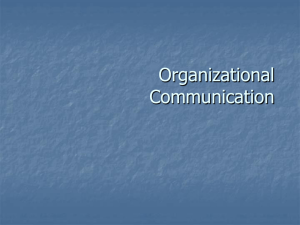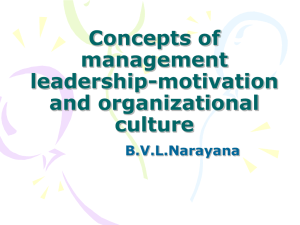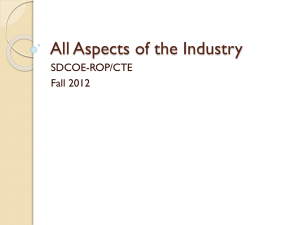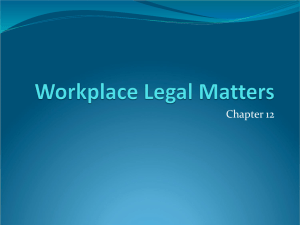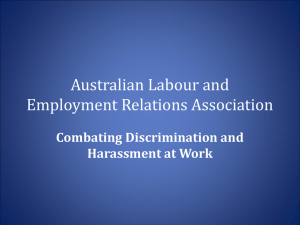e-Learning Answers - 03 Health & Safety
advertisement
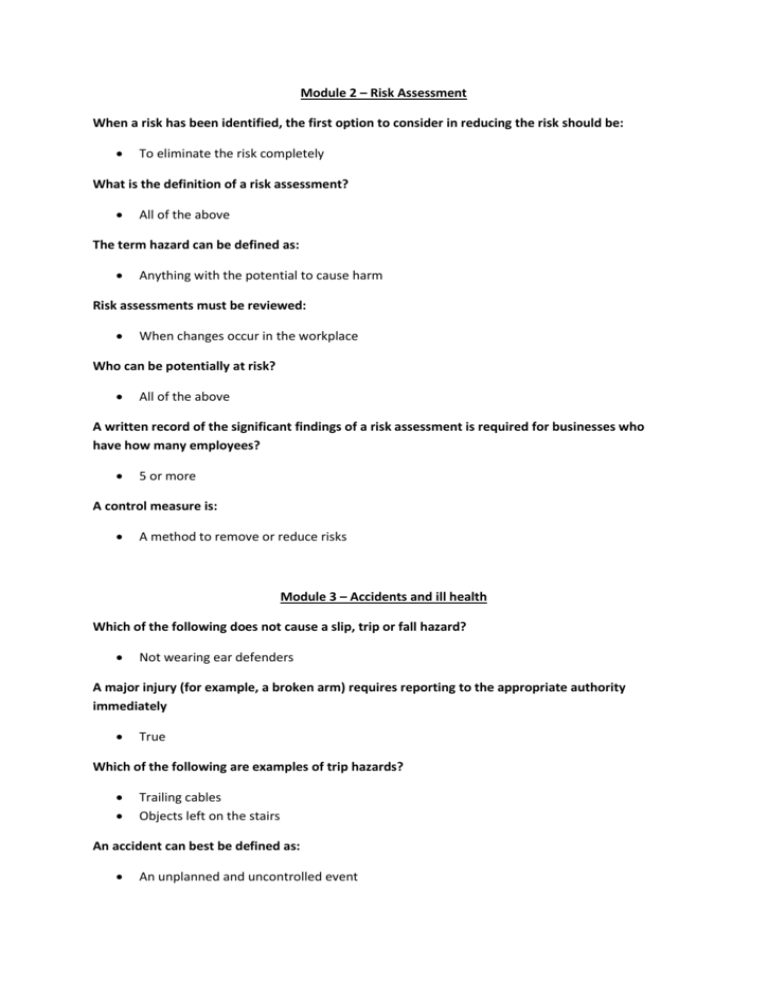
Module 2 – Risk Assessment When a risk has been identified, the first option to consider in reducing the risk should be: To eliminate the risk completely What is the definition of a risk assessment? All of the above The term hazard can be defined as: Anything with the potential to cause harm Risk assessments must be reviewed: When changes occur in the workplace Who can be potentially at risk? All of the above A written record of the significant findings of a risk assessment is required for businesses who have how many employees? 5 or more A control measure is: A method to remove or reduce risks Module 3 – Accidents and ill health Which of the following does not cause a slip, trip or fall hazard? Not wearing ear defenders A major injury (for example, a broken arm) requires reporting to the appropriate authority immediately True Which of the following are examples of trip hazards? Trailing cables Objects left on the stairs An accident can best be defined as: An unplanned and uncontrolled event Which three elements make up the accident triangle? Minor accident Major accident Near miss Under RIDDOR, employers should notify an injury to the appropriate authority if: An employee is off work for more than 3 days Module 4 – Hazardous substances What does this sign mean? (A flame on top of a rectangle) Flammable The regulations dealing with hazardous substances in the workplace are: COSHH Which is the most common route of entry into the body by hazardous substances? Inhalation What does this sign mean? (Two test tubes, with drops of liquid landing on a rectangle and a hand) Corrosive What does this sign mean? (Skull and cross-bones) Toxic If a company uses a toxic substance, what is the most effective control measure? Eliminate the use of the substance Module 5 – Workplace health, safety and welfare The lighting levels in a workplace must be: Suitable and sufficient When provided with PPE, an employee must: Use it as instructed Yellow, triangular safety signs are used to: Warn people of hazards What is the minimum workplace temperature after the first hour of work? 16˚C Which two of the following workplace facilities must an employer provide? Washing facilities Toilets Red circular signs give what type of instruction? Prohibition Module 6 – Fire prevention If you discover a fire in your workplace, what is the first action you should take? Sound the nearest fire alarm call point Fire escape routes should be clearly labelled with a: Green and white sign Fire extinguishers containing water are specifically designed for use on which types of fire? Wood, paper and fabrics What is the best way to reduce the risk of fire occurring in a workplace? Stop the accumulation of waste The main hazard during a fire is the reduction of the availability of oxygen True Which one of the following is not required for a fire to start? Carbon dioxide Module 8 – Equipment safety Work equipment is best described as: Any machinery, appliance, apparatus, tool or installation for use at work Which of the following statements do you believe is true? Cleaning a piece of equipment can be more dangerous than using it as some of the guards may have to be removed Which two of the following statements are actions you should take if equipment is faulty? Tell other members of staff not to use it Don’t use it and tell your line manager immediately Which two of the following statements are examples of good working practices? Choosing the right equipment for the task Switching off equipment when not in use Module 9 – Electricity Electrical systems and equipment should always be installed, repaired and tested by: A qualified and competent person If an electrical appliance breaks down whilst you are using it, what should you do? Report the breakdown to your supervisor immediately Which two of the following are possible consequences of an electric shock? Breathing is prevented The heart stops beating Which three of the following are controls for the prevention of electric shocks? Use low voltage equipment Use double insulated equipment Conduct visual examinations of electrical equipment Module 10 – Occupational health Which of the following statements is true? Approximately 14 million working days are lost each year due to stress Who has responsibility to reduce the level of noise in a workplace? The employer and employee Which occupation is MOST at risk from work related upper limb disorder? Keyboard operator Violence in the workplace is defined as: Harassment, verbal and physical abuse Noise levels in the workplace can most effectively be reduced by: Enclosing or insulating the noisy equipment What type of occupational health hazard is manual handling? Physical Module 11 – Ergonomics DSE workstation chairs should be: Fully adjustable Which is the correct statement? DSE is safe provided that the user follows guidance on its safe use DSE users can help to prevent health problems by: All of the above Employees working at computers for long periods: Should take frequent, short breaks in their routine What is the definition of Ergonomics? Ergonomics is the Inter relationship between people and their work What are the three main risks associated with prolonged usage of DSE? Work related upper limb disorder Visual fatigue Postural fatigue Module 12 – Manual handling When assessing the risks from manual handling operations the four general categories should be considered are: Load, individual, task and environment Which of the following is manual handling? Select all that apply Pushing and pulling Using a trolley Lifting and carrying Which two of the following are the most common injuries sustained whilst manual handling Injuries to hands and feet Back strains Module 13 – Health and Safety Law A written Health and Safety policy is required by: Employers who have five or more employees If the inspector discovers a contravention of the law, can be a spot fine be given? True Which of the following is not an employee responsibility in the Health and Safety at work act? To provide training Who enforces Health and Safety law? Environmental Health Practitioners and HSE Inspectors The designer or manufacturer of a product or service needs to ensure that it meets certain criteria, choose two of the following: It is safe and without the risks to health It has been suitably tested and provided with information Health and Safety enforcers have the power to: Gain access to premises at any reasonable time The Health and Safety at Work Act 1974 places duties on: Employers, employees, designers, manufacturers, self employed If the inspector discovers a contravention of the law, can a spot fine be given? False What are the two types of Health and Safety law? Criminal and Civil Module 14 – Infection control What is the single most important thing you can do to reduce the risk of cross infection? Handwashing Linen used by individuals suffering from infectious diseases which is soiled by blood or bodily fluids should be treated as ‘clinical waste’ True Which of these is a blood-borne infectious disease? Hepatitis A Gloves can be used as a substitute for hand washing? False The Human Immunodeficiency Virus damages cells of the body’s immune system? True When should you wash your hands? All of the above Which of these is not one of the main routes of infection? Water borne Which item of PPE would you not expect to find in the care workplace? High visibility jackets Which of these is not an infection control responsibility of an employee? (Select 2) Record provision and use of PPE Produce a policy or procedure for waste management When handling sharps you should never? (select 2) Fill a sharps box to more than two thirds of its capacity Re-sheath needles You should ALWAYS treat blood and bodily fluids as infectious? True Which of the following is not considered ‘clinical waste’? Glass Which of these are considered universal precautions? All of the above Why is Infection prevention and control an integral part of health care? (Select 2) The elderly and the sick are more prone to infection, due to reduced immunity A large number of people can share both eating and living accommodation Hepatitis A, B and C all effect what organ? Liver Which of these is a role of an Infection Control Nurse? All of the above The term ‘sharps’ refers to? Needles, scalpel blades, stitch cutters Linen used by individuals suffering from infectious diseases which is soiled by blood or bodily fluids should be treated as ‘clinical waste’ False Which of these is a blood-borne infectious disease? Hepatitis C Which of these is an airborne infectious disease? Legionellosis Legionellosis is also known as…? Legionnaires Disease Module 15 – Health and Safety in a healthcare setting Which of the following information would you not report? Peoples opinions of what happened Which of these is not an employees responsibility? To develop and monitor a policy for patient handling in the workplace Which of these could be a physical symptom of stress? (select 3) Migraine headaches Anxiety Fatigue What should you do in cases of violence in the workplace? Report it immediately Which of the following are self-management and relaxation techniques a person can employ to reduce the impact of stress? All of the above Some symptoms of stress can deteriorate relationships between friends, family and colleagues? True Which of the following are examples of work-related violence? All of the above Which of these is not an employers responsibility? To make proper use of safety equipment Which of the following are considered the most common hazards found within the healthcare environment? All of the above Which of these could be an emotional symptom of stress? (select 3) A lack of memory and concentration Depression Paranoia What is one of the major causes of muscular-skeletal disorder in the care environment? Patient handling Which of these is not a commonly used for lifting and handling aid? Block and Tackle


